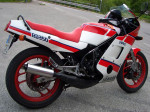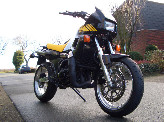Zeeltronic Zündkurve für LC
Moderatoren: solo, Kilroy, Stefan Philipp (M)
Zeeltronic Zündkurve für LC
Hab mir jetzt doch entschlossen die CDI + VCDI von Borut zu kaufen. Hat Jemand schonmal nen Anfang oder weiss Einer die original Yamaha Kurve? Die meisten haben ja ne YPVS und die dreht weiter hoch, bei meiner LC ist bei 9000u/min Schluss (wie original).
Leistungskurve etc war hier schonmal drin aber trotzdem hier noch das Setup:
originale Vergaser, nur neu bedüst
YPVS Membrame
Gianelli Auspuffanlage
Überströmer erweitert beim Anschluss aufs Gehäuse
Kanäle gesäubert, also keine grossen Tuningsmassnamen.
57PS am Hinterrad bei 8500u/min
Leistungskurve etc war hier schonmal drin aber trotzdem hier noch das Setup:
originale Vergaser, nur neu bedüst
YPVS Membrame
Gianelli Auspuffanlage
Überströmer erweitert beim Anschluss aufs Gehäuse
Kanäle gesäubert, also keine grossen Tuningsmassnamen.
57PS am Hinterrad bei 8500u/min
..und wahrscheinlich ist ihnen das nicht mal peinlich, es fehlt ihnen jede Einsicht
Und wieder mal zeigt sich: Sie sind kleinlich, unvermeidlich fremdenfeindlich
Und wieder mal zeigt sich: Sie sind kleinlich, unvermeidlich fremdenfeindlich
- RDThorsten
- Beiträge: 7494
- Registriert: Mi 6. Nov 2002, 01:00
- Wohnort: 26160 Bad Zwischenahn 42,3 km bis zur Nordsee
- Holliheitzer
- IG-Mitglied
- Beiträge: 16813
- Registriert: Mi 4. Sep 2002, 01:00
- Wohnort: Frechen
- Kontaktdaten:
Lies mal den hier und fang' einfach mal damit an.
http://forum.rd350lc.de/viewtopic.php?t=8145
Wenn sie oben raus unwillig wird nimm den Winkel dort wieder zurück.
Horni aus Lüneburg hätte auch eine Borut VCDI an seiner LC.
Ansonsten versuch mal hiermit eine Kurve zu basteln:
So let’s develop a curve…
To keep the motor from kicking back, the cranking/idle speed timing should only be advanced 3-6°’s. Cranking/idle speed starts at 0 RPM, and can extend to 1200-2500 RPM. This will allow a motor to start easily without kickback, and main a smooth idle without the timing curve varying it to any degree... generally 3° - 6° advance BTDC is all that is necessary. The higher the compression, the less advance necessary...as general rule.
I always felt that the standard factory straight-line timing was a compromise between low and high RPM engine safety and drivability... so what I do to get a starting point, is increase the std timing above the idle area by a factor of 1.5.
Let's say in the method above… that the standard straight-line timing was 20°. Then 1.5 X 20=30° timing… from the idle area to roughly 75% of the peak torque RPM. If the motor makes peak torque at 10500, this is about 7875 RPM. So from 0 RPM to about 2500 RPM we have 3-6° advance. At 2500 RPM we ramp straight up to the 30° point, or what ever 1.5 time the standard timing was, and stay at that point till we reach 75% of the peak torque RPM.
Now we get to the slope… that is critical to the engines power and longevity, and it will typically start where the engine starts to pull on the pipe...a range from roughly 75% to 110% of the Peak Torque RPM.
If the motor makes peak torque at 10,500 RPM, this would be roughly 7875-11,550 RPM. The port timing values and pipe design will affect the specific value, but this is a pretty close baseline for most motors.
Generally the resulting timing curve is a straight-line flat slope between these points, although there can be variations to where optimization is found to be needed.... particularly around the peak torque RPM.
The peak torque timing should fall on the slope at around .75 of your original straight-line timing to get in the ball park. In our example, the peak torque timing would be 15°.
The timing slope continues to decline in a more or less straight line to a point about 110% of peak torque RPM. At that point sustaining a retard beyond this region will extend the usable power range by a good margin. This can enable a lower gear ratio and provides a wider power band with no loss of peak torque.
At a point of about 125% of peak torque RPM you are probably at the end of the over-rev region and can start to plug in some advance to act as a Rev limiter if you want. I normally just straight line it out to the right.
This should get you a curve that is close enough to start some serious testing. Without the use of a dyno to help you optimize the curve, then you need to make sure you are jetted correctly and start the on the track testing. Monitor CHT and EGT and take numerous plug chops looking for detonation... primarily around the peak torque RPM. What I do is keep advancing the slope until I start to get a little soft count detonation and then back the curve off by 1-2°'s.
EGT and CHT should follow each other... If the EGT is rising along with CHT you're probably ok. If EGT start to fall under acceleration and CHT continues to rise then that’s a sure sign of detonation.
Important point…Now if I know from experience that with my engine design that I can’t run the factory advance during the ramp up point and to the 75% point then I back that down to a number that will work in the mid RPM range.
Depending on the variables...I've ran all the way down to 0° advance at peak hp
http://forum.rd350lc.de/viewtopic.php?t=8145
Wenn sie oben raus unwillig wird nimm den Winkel dort wieder zurück.
Horni aus Lüneburg hätte auch eine Borut VCDI an seiner LC.
Ansonsten versuch mal hiermit eine Kurve zu basteln:
So let’s develop a curve…
To keep the motor from kicking back, the cranking/idle speed timing should only be advanced 3-6°’s. Cranking/idle speed starts at 0 RPM, and can extend to 1200-2500 RPM. This will allow a motor to start easily without kickback, and main a smooth idle without the timing curve varying it to any degree... generally 3° - 6° advance BTDC is all that is necessary. The higher the compression, the less advance necessary...as general rule.
I always felt that the standard factory straight-line timing was a compromise between low and high RPM engine safety and drivability... so what I do to get a starting point, is increase the std timing above the idle area by a factor of 1.5.
Let's say in the method above… that the standard straight-line timing was 20°. Then 1.5 X 20=30° timing… from the idle area to roughly 75% of the peak torque RPM. If the motor makes peak torque at 10500, this is about 7875 RPM. So from 0 RPM to about 2500 RPM we have 3-6° advance. At 2500 RPM we ramp straight up to the 30° point, or what ever 1.5 time the standard timing was, and stay at that point till we reach 75% of the peak torque RPM.
Now we get to the slope… that is critical to the engines power and longevity, and it will typically start where the engine starts to pull on the pipe...a range from roughly 75% to 110% of the Peak Torque RPM.
If the motor makes peak torque at 10,500 RPM, this would be roughly 7875-11,550 RPM. The port timing values and pipe design will affect the specific value, but this is a pretty close baseline for most motors.
Generally the resulting timing curve is a straight-line flat slope between these points, although there can be variations to where optimization is found to be needed.... particularly around the peak torque RPM.
The peak torque timing should fall on the slope at around .75 of your original straight-line timing to get in the ball park. In our example, the peak torque timing would be 15°.
The timing slope continues to decline in a more or less straight line to a point about 110% of peak torque RPM. At that point sustaining a retard beyond this region will extend the usable power range by a good margin. This can enable a lower gear ratio and provides a wider power band with no loss of peak torque.
At a point of about 125% of peak torque RPM you are probably at the end of the over-rev region and can start to plug in some advance to act as a Rev limiter if you want. I normally just straight line it out to the right.
This should get you a curve that is close enough to start some serious testing. Without the use of a dyno to help you optimize the curve, then you need to make sure you are jetted correctly and start the on the track testing. Monitor CHT and EGT and take numerous plug chops looking for detonation... primarily around the peak torque RPM. What I do is keep advancing the slope until I start to get a little soft count detonation and then back the curve off by 1-2°'s.
EGT and CHT should follow each other... If the EGT is rising along with CHT you're probably ok. If EGT start to fall under acceleration and CHT continues to rise then that’s a sure sign of detonation.
Important point…Now if I know from experience that with my engine design that I can’t run the factory advance during the ramp up point and to the 75% point then I back that down to a number that will work in the mid RPM range.
Depending on the variables...I've ran all the way down to 0° advance at peak hp
Weiss ich, scheint mir aber keine schlechte Idee die 26 Jahre alte CDI auch gleich zu wechseln!Holliheitzer hat geschrieben:Für die LC brauchst Du nur die VCDI, keine CDI!
Das macht alles schon mal günstiger
Ansonsten würde ich eine Kurve nehmen die der YPVS leicht abgeschwächt ebenbürdig ist. Das müsste doch so hinhauen.
Gruss Holli
Werde BBH mal fragen was er für Kurve fährt.
Martin, danke für den Tip, werde das mal studieren!
..und wahrscheinlich ist ihnen das nicht mal peinlich, es fehlt ihnen jede Einsicht
Und wieder mal zeigt sich: Sie sind kleinlich, unvermeidlich fremdenfeindlich
Und wieder mal zeigt sich: Sie sind kleinlich, unvermeidlich fremdenfeindlich
Dann solltest Du aber das Moped auch gleich mal ersetzenMatthiasD hat geschrieben: scheint mir aber keine schlechte Idee die 26 Jahre alte CDI auch gleich zu wechseln!
Oder den Fahrer, der ist sicher auch schon über MHD
Mal ganz Ernst: Wozu neu, wenn sie keine Mucken macht ? Sind immerhin 50 oder 60 Eur die das Leistungsteil kostet.
Und normal hat man ja irgendwelche Teilekisten wo noch zig alte CDI's drin rumfliegen - das reicht eine weile
- 4l0 cafe racer
- Beiträge: 382
- Registriert: So 29. Jul 2007, 10:55
- Wohnort: 6840 Götzis
Die Teile funktionieren nach so langer Zeit bestimmt nicht mehr Optimal, ich will da nur auf nummer sicher gehn. Du hast bestimmt Recht aber das steckt nun mal zwischen den OhrenMK hat geschrieben:Dann solltest Du aber das Moped auch gleich mal ersetzenMatthiasD hat geschrieben: scheint mir aber keine schlechte Idee die 26 Jahre alte CDI auch gleich zu wechseln!
Oder den Fahrer, der ist sicher auch schon über MHD
Mal ganz Ernst: Wozu neu, wenn sie keine Mucken macht ? Sind immerhin 50 oder 60 Eur die das Leistungsteil kostet.
Und normal hat man ja irgendwelche Teilekisten wo noch zig alte CDI's drin rumfliegen - das reicht eine weile
Übrigens bin ich noch keine 26
Josef: wenn da brauchbare Werte rauskommen stelle ich die natürlich hier rein!
..und wahrscheinlich ist ihnen das nicht mal peinlich, es fehlt ihnen jede Einsicht
Und wieder mal zeigt sich: Sie sind kleinlich, unvermeidlich fremdenfeindlich
Und wieder mal zeigt sich: Sie sind kleinlich, unvermeidlich fremdenfeindlich




